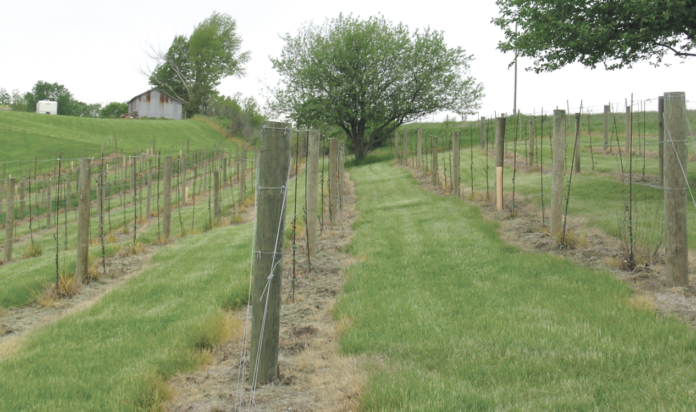
This article was originally published May 23, 2005. The CBJ is revisiting some of the biggest stories from the last 20 years, in celebration of our anniversary.
A Corridor winery with plans to be the state’s first distillery received $60,000 in state assistance last week.
Cedar Ridge Vineyards of rural Swisher, operated by Jeff and Laurie Quint, plans to begin production of wine and spirits this year, but must wait on changes to state law before its business plan can be fully implemented. That is unlikely according to Lynn Walding, administrator of the state’s Alcoholic Beverages Division.
That hasn’t kept other state officials from being excited about the project. Iowa Department of Economic Development Director Mike Blouin, who was in Cedar Rapids last week to announce the state award, used the word “perfect” twice to describe the project, once to say it was the perfect example of Linn and Johnson counties coming together for a project, the other to say the business itself is a perfect new venture for a state intent on pushing value-added agricultural products and tourism.
Because of that, the department was willing to offer $60,000 in loans and forgivable loans from the state’s Value Added Agricultural Products and Processes Financial Assistance Program.
“It’s not the end of what we will do; it’s the beginning,” Mr. Blouin said.
The business will be developed in two phases. The first begins immediately as the company moves into space adjacent to Benz Beverage Depot in downtown Cedar Rapids. There, Mr. Quint will begin to make wine using grapes grown on 10 of the 27 acres at the Swisher vineyard, and will distill spirits such as brandy. That $240,000 project includes acquisition of distillation equipment from Germany. While the company is free to sell the wine directly to consumers, state law prohibits the direct sale of distilled spirits. The three-tiered system requires producers to sell to a wholesaler, who then sells to retail outlets. So, Mr. Quint will distribute the spirits through Benz and other retail outlets across the state.
The second phase of the plan requires a change to state law, something hoped for but not realized during the 2005 legislative session. Such a change, if approved, would allow Cedar Ridge to sell distilled spirits to consumers.
At that time, Mr. Quint plans construction of a $2 million, 11,000- square-foot winery/distillery with kitchen and banquet facilities at the Swisher winery. If the law is changed, that work would begin in 2006, with the facility to open in 2007.
“I have the desire to be part of the development of a new industry here in Iowa,” he said.
Desire may not be enough, however. Mr. Walding with the state said that the Supreme Court decision last week requiring state’s to treat out-of-state alcohol producers the same way they treat in state producers just made Mr. Quint’s hoped-for change much less likely.
“Under that new ruling, (the proposed law change) would open the door to all forms of direct shipment,” he said, adding that any distiller anywhere in the country could sell directly to Iowa consumers — rather than go through the tiered system — if the law is changed.
“That would create all kinds of market havoc if that were to occur,” Mr. Walding said.
Cedar Ridge’s distilled products — which could include vodka and bourbon — could be made with the grapes from the company’s vineyard as well as from alcohol distilled from Iowa corn. Mr. Walding said Grain Processing Center in Muscatine is the largest grain alcohol producer in the country, though its product is shipped out of state where it is processed and used in much of the vodka produced domestically.
Mr. Quint plans to employ 10 full-time equivalents in the business. He is waiting for the law change because the bulk of the business he foresees at the Swisher facility would come from tours and parties. Without the ability to sell his product to such visitors, there is less incentive to build, he said.
Mr. Quint said he could make both red and white wines, though the varieties will depend on the kinds of grapes that might thrive in the Iowa climate. He predicted that he would have success with blends, a trend among Midwestern wineries, he said.




